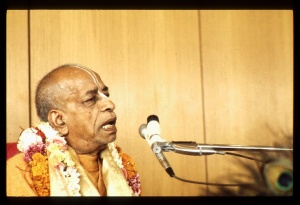SB 5.16.15: Difference between revisions
m (1 revision(s)) |
(Vanibot #0054 edit - transform synonyms into clickable links, which search similar occurrences) |
||
| (One intermediate revision by one other user not shown) | |||
| Line 1: | Line 1: | ||
{{info | {{info | ||
|speaker= | |speaker=Śukadeva Gosvāmī | ||
|listener=King | |listener=King Parīkṣit | ||
}} | }} | ||
[[Category:Srimad-Bhagavatam - Canto 05 Chapter 16]] | |||
[[Category:Bhagavatam Verses Spoken by Sukadeva Gosvami - Vanisource|051615]] | |||
<div style="float:left">'''[[Srimad-Bhagavatam]] - [[SB 5|Fifth Canto]] - [[SB 5.16: A Description of Jambudvipa|Chapter 16: A Description of Jambūdvīpa]]'''</div> | |||
<div style="float:right">[[File:Go-previous.png|link=SB 5.16.13-14]] '''[[SB 5.16.13-14]] - [[SB 5.16.16]]''' [[File:Go-next.png|link=SB 5.16.16]]</div> | |||
{{RandomImage}} | |||
==== TEXT 15 ==== | ==== TEXT 15 ==== | ||
<div class="verse"> | |||
<div | :yeṣv amara-parivṛḍhāḥ saha sura-lalanā-lalāma-yūtha-pataya | ||
yeṣv amara-parivṛḍhāḥ saha sura-lalanā-lalāma-yūtha-pataya upadeva-gaṇair upagīyamāna-mahimānaḥ kila viharanti | :upadeva-gaṇair upagīyamāna-mahimānaḥ kila viharanti | ||
</div> | </div> | ||
| Line 14: | Line 20: | ||
==== SYNONYMS ==== | ==== SYNONYMS ==== | ||
<div class="synonyms"> | |||
<div | ''[//vanipedia.org/wiki/Special:VaniSearch?s=yeṣu&tab=syno_o&ds=1 yeṣu]'' — in which; ''[//vanipedia.org/wiki/Special:VaniSearch?s=amara&tab=syno_o&ds=1 amara]-[//vanipedia.org/wiki/Special:VaniSearch?s=parivṛḍhāḥ&tab=syno_o&ds=1 parivṛḍhāḥ]'' — the best of the demigods; ''[//vanipedia.org/wiki/Special:VaniSearch?s=saha&tab=syno_o&ds=1 saha]'' — with; ''[//vanipedia.org/wiki/Special:VaniSearch?s=sura&tab=syno_o&ds=1 sura]-[//vanipedia.org/wiki/Special:VaniSearch?s=lalanā&tab=syno_o&ds=1 lalanā]'' — of the wives of all the demigods and semidemigods; ''[//vanipedia.org/wiki/Special:VaniSearch?s=lalāma&tab=syno_o&ds=1 lalāma]'' — of those women who are like ornaments; ''[//vanipedia.org/wiki/Special:VaniSearch?s=yūtha&tab=syno_o&ds=1 yūtha]-[//vanipedia.org/wiki/Special:VaniSearch?s=patayaḥ&tab=syno_o&ds=1 patayaḥ]'' — the husbands; ''[//vanipedia.org/wiki/Special:VaniSearch?s=upadeva&tab=syno_o&ds=1 upadeva]-[//vanipedia.org/wiki/Special:VaniSearch?s=gaṇaiḥ&tab=syno_o&ds=1 gaṇaiḥ]'' — by the semi-demigods (the Gandharvas); ''[//vanipedia.org/wiki/Special:VaniSearch?s=upagīyamāna&tab=syno_o&ds=1 upagīyamāna]'' — being chanted; ''[//vanipedia.org/wiki/Special:VaniSearch?s=mahimānaḥ&tab=syno_o&ds=1 mahimānaḥ]'' — whose glories; ''[//vanipedia.org/wiki/Special:VaniSearch?s=kila&tab=syno_o&ds=1 kila]'' — indeed; ''[//vanipedia.org/wiki/Special:VaniSearch?s=viharanti&tab=syno_o&ds=1 viharanti]'' — they enjoy sports. | ||
</div> | </div> | ||
| Line 22: | Line 27: | ||
==== TRANSLATION ==== | ==== TRANSLATION ==== | ||
<div class="translation"> | |||
<div | |||
The best of the demigods, along with their wives, who are like ornaments of heavenly beauty, meet together and enjoy within those gardens, while their glories are sung by lesser demigods known as Gandharvas. | The best of the demigods, along with their wives, who are like ornaments of heavenly beauty, meet together and enjoy within those gardens, while their glories are sung by lesser demigods known as Gandharvas. | ||
</div> | </div> | ||
__NOTOC__ | |||
<div style="float:right; clear:both;">[[File:Go-previous.png|link=SB 5.16.13-14]] '''[[SB 5.16.13-14]] - [[SB 5.16.16]]''' [[File:Go-next.png|link=SB 5.16.16]]</div> | |||
__NOTOC__ | |||
__NOEDITSECTION__ | |||
Latest revision as of 22:07, 18 February 2024

His Divine Grace
A.C. Bhaktivedanta Swami Prabhupada
A.C. Bhaktivedanta Swami Prabhupada
TEXT 15
- yeṣv amara-parivṛḍhāḥ saha sura-lalanā-lalāma-yūtha-pataya
- upadeva-gaṇair upagīyamāna-mahimānaḥ kila viharanti
SYNONYMS
yeṣu — in which; amara-parivṛḍhāḥ — the best of the demigods; saha — with; sura-lalanā — of the wives of all the demigods and semidemigods; lalāma — of those women who are like ornaments; yūtha-patayaḥ — the husbands; upadeva-gaṇaiḥ — by the semi-demigods (the Gandharvas); upagīyamāna — being chanted; mahimānaḥ — whose glories; kila — indeed; viharanti — they enjoy sports.
TRANSLATION
The best of the demigods, along with their wives, who are like ornaments of heavenly beauty, meet together and enjoy within those gardens, while their glories are sung by lesser demigods known as Gandharvas.